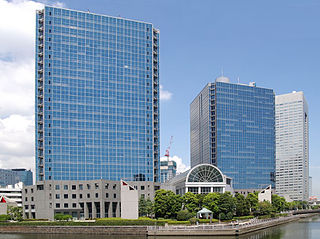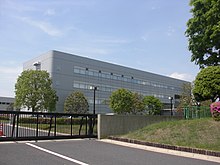
EEPROM (also called E2PROM) stands for electrically erasable programmable read-only memory and is a type of non-volatile memory used in computers, usually integrated in microcontrollers such as smart cards and remote keyless systems, or as a separate chip device to store relatively small amounts of data by allowing individual bytes to be erased and reprogrammed.

Nitto Denko Corporation is a Japanese company that produces tapes, vinyl, LCDs, insulation, and several other products. It was founded in Osaki, Tokyo in 1918 to produce electrical insulation and it survived World War II, despite the destruction of its central offices which have since moved to Osaka. Nitto is a member of the Mitsubishi UFJ Financial Group (MUFG) keiretsu.

Hisashige Tanaka was a Japanese businessman, inventor, mechanical engineer, and rangaku scholar who was prominent during the Bakumatsu and early Meiji period in Japan. In 1875, he founded what became the Toshiba Corporation. He has been called the "Thomas Edison of Japan" or "Karakuri Giemon."

Toyota Tsusho Corporation is a sōgō shōsha, a member of the Toyota Group. Toyota Tsusho has a worldwide presence through its many subsidiaries and operating divisions, including over 150 offices, and 900 subsidiaries and affiliates around the world. Its main business is supporting Toyota Motor's automobile business and other Toyota Group companies, but Toyota Tsusho's business is very diverse, spanning industrial, commercial, and consumer sectors. Business areas run the gamut, including industrial raw materials, agricultural products, and high technology.
Heraeus is a German technology group with a focus on precious and special metals, medical technology, quartz glass, sensors and specialty light sources. Founded in Hanau in 1851, the company is one of the largest family-owned companies in Germany in terms of revenue. Heraeus employs approximately 16,200 people in 40 countries worldwide and generated a total revenue of 29.5 billion euro in 2021.

Showa Denko K. K., founded in 1939 by the merger of Nihon Electrical Industries and Showa Fertilizers, both established by a Japanese entrepreneur Nobuteru Mori, is a Japanese chemical company producing chemical products and industrial materials.

The electronics industry is the economic sector that produces electronic devices. It emerged in the 20th century and is today one of the largest global industries. Contemporary society uses a vast array of electronic devices built-in automated or semi-automated factories operated by the industry. Products are primarily assembled from metal–oxide–semiconductor (MOS) transistors and integrated circuits, the latter principally by photolithography and often on printed circuit boards.

Integrated Micro-electronics, Inc. provides electronics manufacturing services (EMS) and power semiconductor assembly and test services (SATS) with manufacturing facilities in Asia, Europe, and North America. Its headquarters is located in Biñan, Laguna.
Ghavam G. Shahidi is an Iranian-American electrical engineer and IBM Fellow. He is the director of Silicon Technology at the IBM Thomas J Watson Research Center. He is best known for his pioneering work in silicon-on-insulator (SOI) complementary metal–oxide–semiconductor (CMOS) technology since the late 1980s.
Sumitomo Electric Industries, Ltd. is a manufacturer of electric wire and optical fiber cables. Its headquarters are in Chūō-ku, Osaka, Japan. The company's shares are listed in the first section of the Tokyo, Nagoya Stock Exchanges, and the Fukuoka Stock Exchange. In the period ending March 2021, the company reported consolidated sales of US$26,5 billion.
The IEEE Robert N. Noyce Medal is a science award presented by the IEEE for outstanding contributions to the microelectronics industry. It is given to individuals who have demonstrated contributions in multiple areas including technology development, business development, industry leadership, development of technology policy, and standards development. The medal is named in honour of Robert N. Noyce, the co-founder of Intel Corporation. He was also renowned for his 1959 invention of the integrated circuit. The medal is funded by Intel Corporation and was first awarded in 2000.

Umicore N.V.. formerly Union Minière, is a multinational materials technology company headquartered in Brussels, Belgium.
Metalor Technologies, previously Métaux Précieux SA Metalor, founded in 1852, is a subsidiary of Japan's Tanaka Kikinzoku Group. Metalor has become one of the major world suppliers of precious metals related products & procedures. It makes a wide array of alloys, especially for the watch and jewellery industry, supplying many of the Swiss watch brands, although it has expanded its activities far beyond its primary sector.
AKM Semiconductor, Inc. (AKMS) is a semiconductor manufacturer headquartered in San Jose, California. It is subsidiary of Asahi Kasei Microdevices (AKM) based in Tokyo, Japan.
Furukawa Electric Co., Ltd. is a Japanese electric and electronics equipment company.

Nippon Light Metal Holdings Company, Ltd. is a Japanese multinational public industrial holding company that through its subsidiaries is mainly engaged in the manufacture and sale of aluminum and chemical products. It is listed on the Tokyo Stock Exchange and is a constituent of the Nikkei 225.

SUMCO Corporation is a Japanese semiconductor company, manufacturing silicon wafers for semiconductor manufacturers worldwide. The company was established in 1999 as a joint venture between Mitsubishi Materials Corporation and Sumitomo Metal Industries and as of 2013 is the second largest silicon wafer producer in the world, after Shin-Etsu Handotai, with a market share of 30%.
AMADA WELD TECH, a subsidiary of AMADA WELD TECH CO., LTD, designs and manufactures equipment and systems for resistance welding, laser welding, laser marking, laser cutting, laser micro machining, hermetic sealing, micro tig welding, and hot bar reflow soldering and bonding. Established in 1948, AMADA WELD TECH is headquartered in Monrovia, California, US. The company's equipment is used in numerous industries, chief among which are medical, aerospace, automotive, batteries, and electronic components. AMADA WELD TECH has approximately 200 employees, with 7 sales and manufacturing offices serving about 12,000 customers worldwide. More than 80,000 items are manufactured annually. The company is certified to ISO 9001:2015, China Compulsory Certificate (CCC), European Conformity (CE), and Canadian Standards Association (CSA) quality certifications.
The London Platinum and Palladium Market (LPPM) is an over-the-counter trading centre for platinum and palladium and a commodity trading association. London has always been a centre for the research in and development of most of the platinum group metals. Trade was established in the early 20th century, typically by existing dealers of gold and silver. The LPPM has been involved in fixing the world market prices of platinum and palladium since 1989.
Shindengen Electric Manufacturing is a Japanese, Tokyo-based company, manufacturing power semiconductor devices, electric power systems, automotive electronics products and solenoid products. It is listed on the Tokyo Stock Exchange and the company's largest shareholder is Honda.













